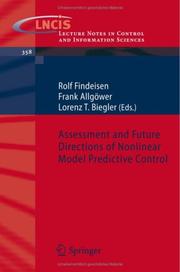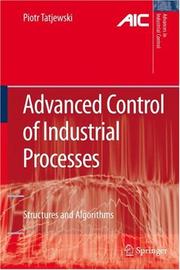| Listing 1 - 3 of 3 |
Sort by
|

ISBN: 9783540726982 3540726985 3540726993 Year: 2007 Publisher: Berlin, Germany ; New York, New York : Springer,
Abstract | Keywords | Export | Availability | Bookmark
 Loading...
Loading...Choose an application
- Reference Manager
- EndNote
- RefWorks (Direct export to RefWorks)
Thepastthree decadeshaveseenrapiddevelopmentin the areaofmodelpred- tive control with respect to both theoretical and application aspects. Over these 30 years, model predictive control for linear systems has been widely applied, especially in the area of process control. However, today’s applications often require driving the process over a wide region and close to the boundaries of - erability, while satisfying constraints and achieving near-optimal performance. Consequently, the application of linear control methods does not always lead to satisfactory performance, and here nonlinear methods must be employed. This is one of the reasons why nonlinear model predictive control (NMPC) has - joyed signi?cant attention over the past years,with a number of recent advances on both the theoretical and application frontier. Additionally, the widespread availability and steadily increasing power of today’s computers, as well as the development of specially tailored numerical solution methods for NMPC, bring thepracticalapplicabilityofNMPCwithinreachevenforveryfastsystems.This has led to a series of new, exciting developments, along with new challenges in the area of NMPC.
Predictive control --- Nonlinear control theory --- Commande non linéaire --- Congresses. --- Congrès --- Mechanical Engineering - General --- Mechanical Engineering --- Engineering & Applied Sciences --- Model based predictive control --- Model predictive control --- Engineering. --- System theory. --- Control engineering. --- Robotics. --- Mechatronics. --- Control, Robotics, Mechatronics. --- Systems Theory, Control. --- Automatic control --- Systems, Theory of --- Systems science --- Science --- Philosophy --- Systems theory. --- Mechanical engineering --- Microelectronics --- Microelectromechanical systems --- Automation --- Machine theory --- Control engineering --- Control equipment --- Control theory --- Engineering instruments --- Programmable controllers

ISBN: 1280803703 9786610803705 1846286352 1846286344 184996632X Year: 2007 Publisher: London : Springer,
Abstract | Keywords | Export | Availability | Bookmark
 Loading...
Loading...Choose an application
- Reference Manager
- EndNote
- RefWorks (Direct export to RefWorks)
Advanced Control of Industrial Processes presents the concepts and algorithms of advanced industrial process control and on-line optimisation within the framework of a multilayer structure. Relatively simple unconstrained nonlinear fuzzy control algorithms and linear predictive control laws are covered, as are more involved constrained and nonlinear model predictive control (MPC) algorithms and on-line set-point optimisation techniques. The major topics and key features are: • Development and discussion of a multilayer control structure with interrelated direct control, set-point control and optimisation layers, as a framework for the subject of the book. • Systematic presentation and stability analysis of fuzzy feedback control algorithms in Takagi-Sugeno structures for state-space and input-output models, in discrete and continuous time, presented as natural generalisations of well-known practical linear control laws (like the PID law) to the nonlinear case. • Thorough derivation of most practical MPC algorithms with linear process models (dynamic matrix control, generalised predictive control, and with state-space models), both as fast explicit control laws (also embedded into appropriate structures to cope with process input constraints), and as more involved numerical constrained MPC algorithms. • Development of computationally effective MPC structures for nonlinear process models, utilising on-line model linearisations and fuzzy reasoning. • General presentation of the subject of on-line set-point improvement and optimisation, together with iterative algorithms capable of coping with uncertainty in process models and disturbance estimates. • Complete theoretical stability analysis of fuzzy Takagi-Sugeno control systems, discussion of stability and feasibility issues of MPC algorithms as well as of tuning aspects, discussion of applicability and convergence of on-line set-point improvement algorithms. • Thorough illustration of the methodologies and algorithms by worked examples in the text. • Control and set-point optimisation algorithms together with the results of simulations based on industrial process models, stemming primarily from the petrochemical and chemical industries. Starting from important and well-known techniques (supplemented with the original work of the author), the book includes recent research results mainly concerned with nonlinear advanced feedback control and set-point optimisation. It is addressed to readers interested in the important basic mechanisms of advanced control, including engineers and practitioners, as well as to research staff and postgraduate students. Advances in Industrial Control aims to report and encourage the transfer of technology in control engineering. The rapid development of control technology has an impact on all areas of the control discipline. The series offers an opportunity for researchers to present an extended exposition of new work in all aspects of industrial control.
Process control --- Predictive control. --- Fuzzy algorithms. --- Mathematical models. --- Algorithms --- Cluster set theory --- Fuzzy mathematics --- Model based predictive control --- Model predictive control --- Automatic control --- Control of industrial processes --- Industrial process control --- Manufacturing processes --- Quality control --- Chemical engineering. --- Mathematical optimization. --- Industrial engineering. --- Control and Systems Theory. --- Industrial Chemistry/Chemical Engineering. --- Calculus of Variations and Optimal Control; Optimization. --- Industrial and Production Engineering. --- Management engineering --- Simplification in industry --- Engineering --- Value analysis (Cost control) --- Optimization (Mathematics) --- Optimization techniques --- Optimization theory --- Systems optimization --- Mathematical analysis --- Maxima and minima --- Operations research --- Simulation methods --- System analysis --- Chemistry, Industrial --- Engineering, Chemical --- Industrial chemistry --- Chemistry, Technical --- Metallurgy --- Control engineering. --- Calculus of variations. --- Production engineering. --- Manufacturing engineering --- Process engineering --- Industrial engineering --- Mechanical engineering --- Isoperimetrical problems --- Variations, Calculus of --- Control engineering --- Control equipment --- Control theory --- Engineering instruments --- Automation --- Programmable controllers

ISBN: 1852336943 9780857293985 9781852336943 0857293982 Year: 2007 Publisher: London : Springer London : Imprint: Springer,
Abstract | Keywords | Export | Availability | Bookmark
 Loading...
Loading...Choose an application
- Reference Manager
- EndNote
- RefWorks (Direct export to RefWorks)
From power plants to sugar refining, model predictive control (MPC) schemes have established themselves as the preferred control strategies for a wide variety of processes. The second edition of Model Predictive Control provides a thorough introduction to theoretical and practical aspects of the most commonly used MPC strategies. It bridges the gap between the powerful but often abstract techniques of control researchers and the more empirical approach of practitioners. Model Predictive Control demonstrates that a powerful technique does not always require complex control algorithms. The text features material on the following subjects: general MPC elements and algorithms; commercial MPC schemes; generalized predictive control multivariable, robust, constrained nonlinear and hybrid MPC; fast methods for MPC implementation; applications. All of the material is thoroughly updated for the second edition with the chapters on nonlinear MPC, MPC and hybrid systems and MPC implementation being entirely new. Many new exercises and examples have also have also been added throughout and MATLAB® programs to aid in their solution can be downloaded from extras.springer.com. The text is an excellent aid for graduate and advanced undergraduate students and will also be of use to researchers and industrial practitioners wishing to keep abreast of a fast-moving field.
Predictive control. --- Modelvorming --- Optimalisering --- Procesregeling --- Stochastische processen --- Modelvorming. --- Optimalisering. --- Procesregeling. --- Stochastische processen. --- Systems Theory, Control. --- Systems theory. --- Predictive control --- Model based predictive control --- Model predictive control --- Engineering. --- Chemical engineering. --- System theory. --- Control engineering. --- Electronics. --- Microelectronics. --- Control. --- Industrial Chemistry/Chemical Engineering. --- Electronics and Microelectronics, Instrumentation. --- Microminiature electronic equipment --- Microminiaturization (Electronics) --- Electronics --- Microtechnology --- Semiconductors --- Miniature electronic equipment --- Electrical engineering --- Physical sciences --- Control engineering --- Control equipment --- Control theory --- Engineering instruments --- Automation --- Programmable controllers --- Systems, Theory of --- Systems science --- Science --- Chemistry, Industrial --- Engineering, Chemical --- Industrial chemistry --- Engineering --- Chemistry, Technical --- Metallurgy --- Construction --- Industrial arts --- Technology --- Philosophy --- Control and Systems Theory. --- Control theory. --- Chemistry, Technical. --- Systems Theory, Control . --- Industrial Chemistry. --- Dynamics --- Machine theory --- Chemical technology --- Technical chemistry --- Chemistry --- Chemical engineering --- Automatic control.
| Listing 1 - 3 of 3 |
Sort by
|

 Search
Search Feedback
Feedback About UniCat
About UniCat  Help
Help News
News